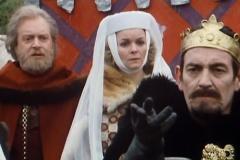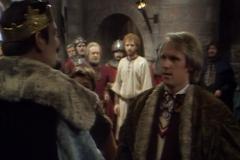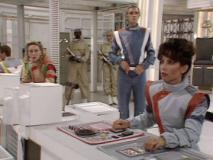Classic Series Broadcasting UpdateRadio Times has now confirmed that repeats of the Jon Pertwee serial
The Green Death will form part of BBC Four's season of programmes from and about 1973 (to tie in with the channel's screening of Life on Mars). From Monday 3 April to Wednesday 5 April, the six-part story will be shown in three double bills from 7.10 to 8.00pm, according to
this linkand
this.
BBC Focus ControversyAs reported by Outpost Gallifrey on 17 March, the April edition of BBC Focus dedicates its cover and a large article to the forthcoming book
The Science of Doctor Who, with free copies of Paul Parsons' book going to the magazine's subscribers. Today's
Media Guardian, however, reports that the "extensive coverage" has come in for criticism - because the magazine is edited by Paul Parsons himself - but that "the BBC has defended" Focus and its editor. A BBC spokeswoman is quoted as saying that there are "viable commercial and editorial reasons" to support the coverage, that Paul Parsons is a Doctor Who expert so a natural choice to write the magazine article, and that "all profits [from the magazine's sales] are returned to the BBC for the benefit of the licence fee payer." The full article is available at their website; it's also been reported at
The Independent.
Other ItemsBBC New Media has begun to unveil its plans for the development of the BBC's online presence, and a report today from
BBC News highlights the intention to allow seven-day online access to television programmes "like Doctor Who." "Ashley Highfield, director of the BBC's new media division, shared a platform with Microsoft boss Bill Gates at a technology conference in Las Vegas. Mr Highfield said the BBC would work with technology firms like Microsoft. He also showed off the BBC's Integrated Media Player (iMP), designed to allow users seven-day access to TV shows. The iMP, which uses peer-to-peer technology to distribute BBC content across the internet, has been undergoing extensive user trials. 'Audience needs are changing. They want to consume media on their own terms, anytime, anyplace, anyhow,' Mr Highfield told the audience at the Mix06 conference. 'If we want to stay relevant in the digital age, the BBC must respond to this challenge by some seriously good technological innovation, resulting in products like the iMP, through partnerships such as this one with Microsoft.'"
Sci Fi Wire, continuing their daily coverage of Doctor Who with featurettes, reports that "Russell T. Davies, executive producer of the new Doctor Who, told SCI FI Wire that his revival of the long-running British SF drama was bolstered by a team of writers committed to the show's success. 'None of them had written for the program before,' he said in an interview. 'But they had started their own television series and written their own dramas, and they'd also commentated on Doctor Who in the absence when it was off the air. They were very well-known for it, and you needed people who knew all those tiny details that make all the difference in telling a science fiction story. For example, the Doctor can't do magic, and it's very easy for new writers to assume that the Doctor and the Tardis can do anything, because the program is a very free-format. He can travel in time and space and land anywhere, but there are actually very strong limits within that as to what you can do and how an adventure works, so I'm glad we went for people who were well-versed in that sort of storytelling, because I didn't need to have script meetings in which I was telling them how the science fiction of Doctor Who worked. In addition to writing half of the first 13-episode season himself, Davies came up with basic storylines and settings for the remaining scripts, which were divided up according to the writers' individual strengths. 'Mark Gatiss, for example, is one of the writers and stars of [the British sketch comedy show] The League of Gentlemen, which is a marvelously dark and gothic comedy. I knew he had a great love of Victoriana, so when we had an episode set in the Victorian era with Charles Dickens ['The Unquiet Dead,' airing on SCI FI March 24], it was absolutely automatic that we give it to Mark. Steven Moffat is the writer who invented Coupling, and he's brilliant at structure and plot, so he was the only writer outside of myself to be given a two-parter ['The Empty Child/The Doctor Dances,' airing later this season], because they're very difficult to construct.' A relatively new writer, Rob Shearman, had previously written an audio play feature the Doctor's most famous nemeses, the Daleks. 'You could not get a cleverer, more intelligent and exciting take on the Doctor's old enemies than that,' Davies said. 'As a matter of honor, I felt we had to offer [the episode 'Dalek,' airing on SCI FI April 14,] to him, and it was a very big chance for Rob, writing a big piece of adventure television for prime time BBC1, and he did it magnificently. So all these decisions just made sense, really, and again, we've done that with the second [season].' Davies has written several scripts for season two, which is the final weeks of production back in the United Kingdom, and he has brought in Gatiss and Moffat as well as a group of new writers for the remaining episodes. 'They're very carefully chosen, because Doctor Who is so unique and it's so different every week. Each episode even has a different style, so you need to balance the writers and work out where their episodes play within the overall season, so we plan it all out very carefully.'"
Another report on
Sci Fi Wire says that "Euros Lyn, who directed the Doctor Who episode 'The Unquiet Dead' (airing on Sci Fi Channel March 24 at 9 p.m. ET/PT), told SCI FI Wire that it was an enjoyable challenge to create the period adventure with a guest appearance by Charles Dickens. 'There were lots of things we wanted to do in the episode,' he recalled in an interview, 'including lots of crowd duplication shots in the theater. But knowing we had to get the dramatic scenes done first and get the story covered, we had to leave big-scale shots to the end of the day, which meant we sometimes didn't get them. Sometimes we'd reach the end of our day, and some of those grander shots fell off the list, so that was tough. We also had big snow scenes with paper snow in whipping wind, with horse-drawn carriages and lots of extras, and those were really tricky to achieve as well, so there were lots of big set pieces that were a real challenge.' In 'The Unquiet Dead,' the Doctor (Christopher Eccleston) and Rose (Billie Piper) travel back to Cardiff on Christmas Eve of 1869, where they discover the bodies of the dead are being possessed by the alien Gelth. Their main ally against the creatures: a world-weary playwright named Charles Dickens (Simon Callow). 'It was brilliant to get him,' Lyn said about the casting of Callow. 'He's an actor of such great stature and experience, and the work that he's associated with is work of quality. The secret to getting him interested was the script. He read the script and loved it, but he's also a Dickens freak. He loves everything about Dickens and has written books and performed one-man shows about him, so the material was of great interest to him, and I think that helped. Yes, it's Doctor Who, and yes, it's popular drama, but it also has an erudite and classical dimension to it.' The director is currently working on another history-based episode for season two, which begins airing in Britain in April. 'The Girl in the Fireplace' is set in 18th-century France and guest-stars Sophia Myles (Tristan and Isolde) as the French noblewoman Madame du Pompadour. 'They're very different episodes, but that's one of the brilliant things about Doctor Who: Every episode is a genre piece and utterly different to each other. It's like starting again every time; virtually nothing is current from one episode to another. One day you could be shooting on a set 2 billion years in the future, and the next morning you're stepping onto a set in 1879. So that's wonderful.'"
The
Capital Times of Wisconsin says of the new series, "And it's really quite a hoot, faithful to the goofy charm of the original series while doing the serious upgrading and improving that was so desperately needed. Right from the opening credits, which use the spacey original theme music and show the Doctor's TARDIS, which looks like a 1950s emergency phone booth, winging through space and time, you know you're in good hands. For the uninitiated, the Doctor is a renegade space/time traveler who zips through the cosmos battling bad guys, trading quips with aliens and otherwise having a grand old time. ... In the first of last Friday's two episodes, the Doctor met up with Rose while trying to save London from being overrun by sentient department store mannequins. You see, this alien consciousness was able to animate plastic, using the London Eye Ferris wheel as a transmitter, and ... you know, not many 'Doctor Who' plots hold up on paper. Just know that everybody seemed to be having a good time, and this is that rare science-fiction show that not only puts an emphasis on comedy but is also pretty funny. I don't know who Piper is, but she's pretty great as Rose, sometimes gobsmacked at the wonders that the Doctor shows her and other times amusingly unfazed. She and Eccleston develop great chemistry: part father-daughter and part friends, with maybe a little sexual tension thrown in for good measure, quite quickly. The second episode was even better, as the Doctor and Rose whisk forward a few million years to watch the destruction of the Earth with a roster of VIAs (Very Important Aliens), who for some reason decide to commemorate Earth's passing by playing what they think is one of our world's great pieces of art: the '80s pop hit 'Tainted Love' by the group Soft Cell. Fans used to getting their fix of gritty, violent science fiction every night from 'Battlestar Galactica' (which coincidentally is also a remake of a cheesy old sci-fi series) might have a little trouble to adjusting to the whimsy of 'Doctor Who.' But I'll bet even they'll catch the groove of this amiably daffy show, and Sci-Fi will have another remake on its hands that tops the original. What's next, an Emmy-quality reimagining of 'Buck Rogers in the 25th Century'?"
(Thanks to Steve Tribe, Paul Engelberg, Peter Weaver, Cliff Chapman, Paul Hayes)





















